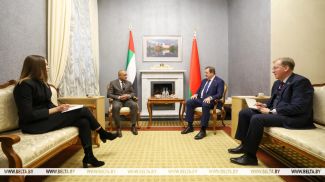MOSCOW, 30 November (BelTA) – Provocations near borders of the Collective Security Treaty Organization member states are unacceptable, BelTA learned from the statement released by the CSTO Permanent Council on 30 November to address military activity in the territories adjacent to the CSTO's responsibility area and the military activity's impact on Eurasian security.
The statement reads: “We remark upon the inadmissibility of provocative actions near the borders of the CSTO member states, which can lead to dangerous incidents and an increase in military-political tensions. We express deep concern about the movement of foreign terrorists and militants into active combat zones. The CSTO member states emphasize the importance of reducing tensions on the continent and look forward to a constructive response from NATO countries to the measures presented in the CSTO foreign ministers' open address to the foreign ministers of the NATO member states on strengthening mutual trust and advancing cooperation of 22 May 2019.”
According to the statement, the missile defense situation is developing in a negative way. The CSTO member states believe that the buildup of strategic missile defenses and their unilateral deployment in various parts of the world may have a negative impact on international and regional security, affects security interests of many countries, undermines the foundation for working out and using multilateral political and diplomatic methods for counteracting the propagation of missiles and missile technologies. The CSTO member states stand against such steps and deem attempts to ensure one's own security at the expense of the security of others unacceptable, the document reads.
The CSTO member states regret the termination of the Intermediate-Range Nuclear Forces Treaty (INF Treaty) of 1987. Additional risks for an arms race and the growing missile threat emerge in the absence of the treaty, which was instrumental to arms control for 30 years.
The CSTO Permanent Council also noted that the policy in favor of military political deterrence of the CSTO member states is unacceptable. The CSTO Permanent Council stressed that the buildup of existing, military forces, military infrastructure, and logistics capabilities as well as the creation and deployment of new ones and the increase in the scale of military exercises in the territories adjacent to the CSTO's responsibility area lead to higher tensions and undermine efforts meant to form common and indivisible security space.
The CSTO member states expressed concern about the violation of the Montreux Convention Regarding the Regime of the Straits of 1936 and called for steadfast adherence to the convention. The CSTO member states are convinced that the reduction of military activities near the CSTO responsibility area, the withdrawal of the already deployed forces or constantly rotating forces to their permanent stations, the refusal to use force or the refusal to threaten to us force, and the rejection of the policy meant to secure military supremacy could contribute to the de-escalation of the situation and the reduction of the risk of unintentional incidents.













